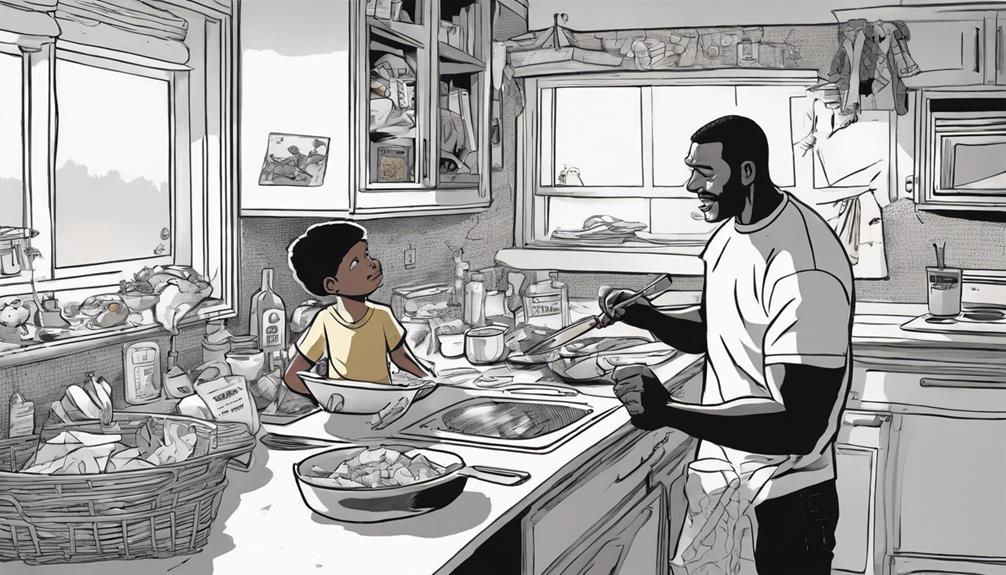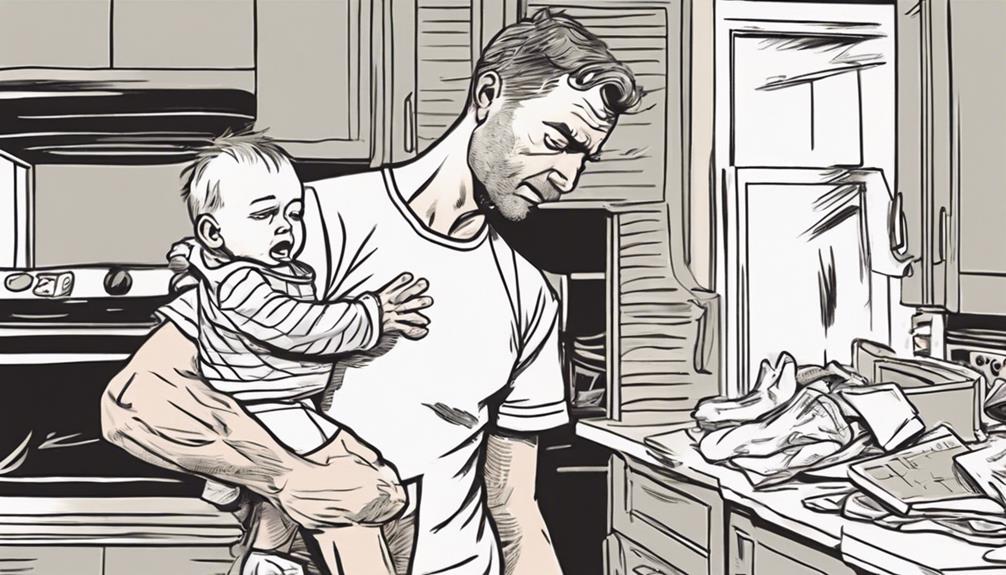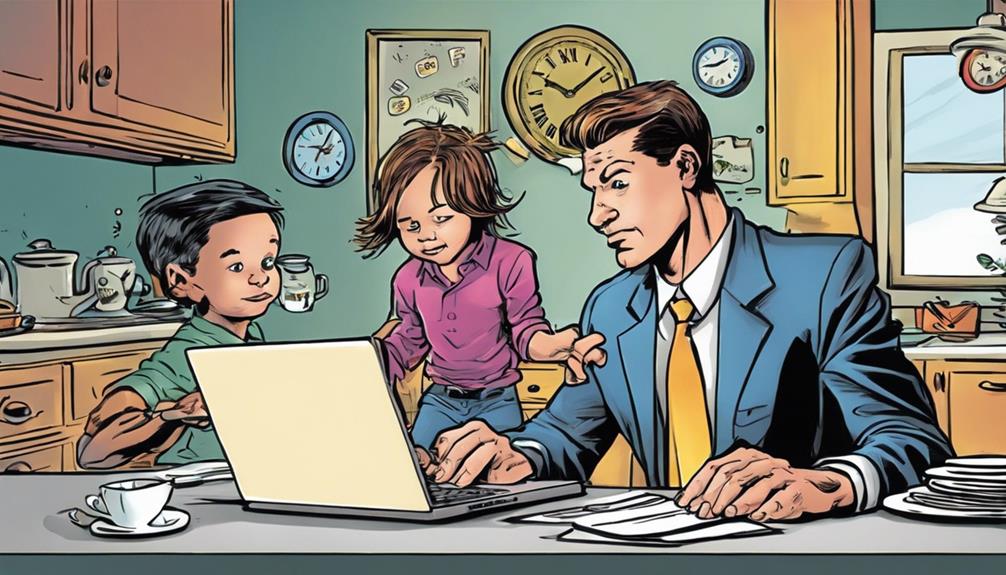Navigating a ship through stormy seas doesn’t compare to breaking stay-at-home dad stereotypes.
I write to Modern Dads because here, we get real. And I mean it.
Being a stay-at-home dad since 2019, I’ve faced raised eyebrows and outdated comments. But, it’s the moments of triumph, the small victories that keep me going. I’ve learned it’s not just about defending my choice but about celebrating it.
Society often slots us into roles without asking. When I chose to stay home with Emily (8) and Liam (5), the feedback wasn’t all cheers. Yet, each day, I see the impact. My journey isn’t just about changing diapers or making lunches; it’s about shaping futures.
Real-Life Stay-at-Home Dad Moment
Just last week, a moment with Emily highlighted why breaking stereotypes matters. She was working on a school project about family roles. She said, ‘Dad, you’re my hero because you’re not afraid to be different.’ That hit home.
Here I was, worried about societal judgments, yet my daughter saw strength in our family dynamic. This conversation, simple yet profound, reinforced my belief.
Being a stay-at-home dad is more than a role; it’s a statement. It’s about showing Emily and Liam that it’s okay to defy expectations and carve your own path.
Key Takeaways
- Challenge traditional gender roles to thrive as a stay-at-home dad.
- Seek support to combat societal scrutiny and negative perceptions.
- Advocate for recognition of diverse fatherhood contributions.
- Redefine masculinity to include nurturing qualities in parenting.
Unrealistic Expectations and Gender Roles

In today’s society, stay-at-home dads often face unrealistic expectations and rigid gender roles that can hinder their ability to parent effectively. Challenging stereotypes and breaking barriers is crucial for these dads to thrive in their role. Society tends to place expectations on fathers to be the breadwinners, while mothers are often seen as the primary caregivers. This traditional view can create pressure on stay-at-home dads to conform to societal norms, leading to feelings of inadequacy and isolation.
Breaking free from these constraints is essential for stay-at-home dads to cultivate a nurturing and supportive environment for their children. By challenging stereotypes that dictate fathers must prioritize work over family, these dads can create a more balanced approach to parenting. Embracing a more flexible and inclusive definition of fatherhood allows stay-at-home dads to be fully present and engaged in their children’s lives, fostering strong relationships and emotional bonds. By breaking barriers and redefining gender roles, stay-at-home dads can confidently navigate their parenting journey with authenticity and purpose.
Judgment From Society and Peers
Facing societal pressures and scrutiny, stay-at-home dads often find themselves navigating judgment from both society and peers, which can impact their parenting experience significantly. Social stigma surrounding traditional gender roles can lead to negative perceptions of stay-at-home dads, with some viewing them as not fulfilling their provider role or going against societal norms. This can create feelings of inadequacy and isolation for stay-at-home dads, affecting their self-esteem and mental well-being.
Moreover, peer pressure can exacerbate these challenges, as interactions with other parents or friends may involve subtle or overt questioning of their choice to stay at home. This can lead to defensive behaviors or a sense of constantly needing to justify their decision, adding stress to an already demanding role. Stay-at-home dads may also face skepticism about their parenting abilities, further intensifying feelings of being judged or misunderstood.
In navigating these societal and peer judgments, it’s crucial for stay-at-home dads to seek support from understanding individuals or groups who can provide validation and encouragement, helping them combat the negative impact of external opinions.
Lack of Recognition and Support

Amidst the challenges faced by stay-at-home dads, their significant contributions often go unnoticed, leading to a lack of recognition and support in society. Support systems for stay-at-home dads aren’t as prevalent compared to those for stay-at-home moms, perpetuating societal perceptions that parenting is primarily a mother’s responsibility. This lack of recognition can leave stay-at-home dads feeling isolated and undervalued, impacting their mental well-being and overall satisfaction in their role.
Studies have shown that stay-at-home dads who feel supported by their partners, families, and communities experience greater fulfillment and success in their caregiving duties. However, the prevailing stereotypes and societal expectations can hinder the establishment of these crucial support systems. It’s essential for society to acknowledge and appreciate the diverse ways in which fathers contribute to parenting and household responsibilities, breaking free from traditional gender roles.
Assumptions About Masculinity and Parenting
Assumptions about masculinity and parenting often shape societal attitudes towards stay-at-home dads, influencing how their roles are perceived and valued. In a society where traditional gender roles have long been entrenched, the concept of men taking on caregiving responsibilities can challenge deep-seated beliefs about gender norms. This clash can sometimes lead to the reinforcement of toxic masculinity, where the idea of a man prioritizing parental involvement is viewed as a deviation from the norm.
Parental involvement is crucial for a child’s development, regardless of the caregiver’s gender. However, stereotypes surrounding masculinity can create barriers for stay-at-home dads seeking to actively participate in their children’s lives. These stereotypes often portray men as primary breadwinners rather than nurturers, contributing to the undervaluing of caregiving roles traditionally associated with women.
Challenging these assumptions requires a shift towards recognizing the importance of parental involvement irrespective of gender. By acknowledging that masculinity can encompass nurturing qualities, society can begin to break down harmful stereotypes and create a more inclusive environment for all parents.
Balancing Work and Family Responsibilities

The challenge of balancing work and family responsibilities can be particularly pronounced for stay-at-home dads navigating societal expectations and personal commitments. Time management and prioritizing family are crucial aspects to consider in maintaining a healthy balance between work and family life. Effective time management allows you to allocate dedicated slots for both work and family activities, ensuring neither aspect is neglected.
Tips for Balancing Work and Family Responsibilities:
- Create a Schedule: Establish a routine that includes designated work hours and dedicated family time.
- Delegate Tasks: Don’t hesitate to ask for help from your partner or older children with household chores or errands.
- Utilize Technology: Use apps or tools to organize your tasks and appointments efficiently.
- Regular Communication: Keep an open line of communication with your family to discuss needs, expectations, and potential adjustments to schedules.
Can debunking myths about stay-at-home dads help in navigating stereotypes?
Navigating stereotypes can be challenging, but debunked myths about stay-at-home dads can help. By shedding light on the reality, we can break down outdated beliefs and create a more inclusive society. Understanding the truth behind stay-at-home dads can lead to greater acceptance and support for all parents.
Is There a Way to Overcome Stay-at-Home Dad Stereotypes?
The stereotypes of male caregivers are still prevalent in our society today. However, there are ways to overcome these outdated assumptions. Increasing visibility of stay-at-home dads in media and promoting open discussions about caregiving can help shift societal attitudes and challenge these stereotypes.
How Can Stay-at-Home Dads Navigate Career Sacrifices and Stereotypes?
Stay-at-home dads often face career sacrifices for stay-at-home dads and stereotypes. To navigate these challenges, networking with other stay-at-home parents can provide valuable support and advice. Additionally, pursuing flexible work-from-home opportunities or part-time positions can help balance parenting responsibilities while maintaining career goals.
How Can Stay-at-Home Dads Avoid Parental Burnout?
Stay-at-home dads can avoid parental burnout by identifying parental burnout symptoms early on. They should prioritize self-care, seek support from friends and family, and communicate openly with their partner about their feelings. Taking regular breaks and engaging in hobbies can also help prevent burnout.
Conclusion
Tackling stay-at-home dad stereotypes is tough. It’s about proving we’re more than snack-makers. We’re reshaping fatherhood itself.
Why’s this big? Because it’s about showing the world that dads can be top-notch caregivers too.
—
Have you faced these stereotypes? Share your story below. Then, help us grow by sharing this post with friends. Let’s make #ModernDads trend!


Leave a Reply